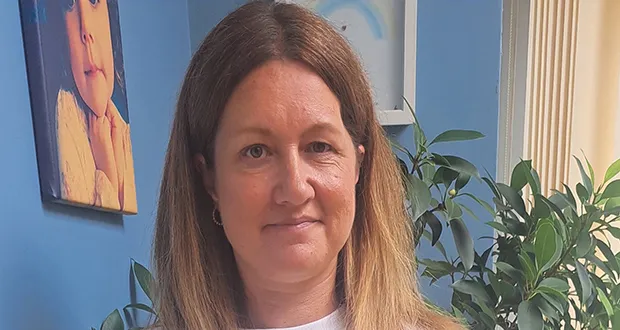By Editorial Staff
Lisa Kenny, from Balbriggan, North Dublin, spoke for the first time about her experience of stroke aged 36 in 2019 – four days after she brought her new baby, Alfie, home.
The mother of two, now 42, said her second pregnancy had been normal and no health problems had arisen during her hospital appointments.
Alfie was born on October 4 but, due to complications such as pneumonia and seizure after her stroke, it would be seven months before Lisa could return home to him.
She now lives with aphasia, an acquired language disorder that frequently occurs following brain injury, such as stroke, and has shared her story as part of Aphasia Awareness Month.
Aphasia affects understanding of spoken or written language, including reading and writing or the production of spoken language.
Lisa’s first symptom was a headache, she later lost feeling in her right arm and leg and her face began to droop.
Her fiancé, Paul, phoned for an ambulance and a brain scan revealed she had experienced a haemorrhagic stroke.
She underwent brain surgery two days later and again two months later to replace her skull bone.
“With my stroke and aphasia, it was hard to suddenly be separated from my children because I couldn’t talk and I was on a lot of medication,” said Lisa.
“When I was in hospital, especially through COVID, it was so hard because I couldn’t see my children, Emily, now 13, and Alfie.”
Lisa was later moved to the rehabilitation ward, where she worked with an occupational therapist, physical therapist and speech and language therapist.
“Now, I’m okay with speaking and talking, it’s 50/50. I have got back to normal texting, which is huge for my communication,” she said.
As a result of her aphasia, she could not return to work and the family had to move out of their home, as it was challenging for her to move around in.
Lisa uses many Irish Heart Foundation supports to aid her recovery, including the Young Stroke Survivors Network, the Life after Stroke private Facebook group, the Aphasia-Friendly Café and the Rhythm of Recovery Choir.
“I continue to push and challenge myself and just try to stay positive.
“I keep going – keep strong and healthy – for Emily and Alfie.
“I choose to laugh, love and be happy because life keeps going on and I will always have them with me.
“My speech and language and physiotherapy are the key, too.”
She is working with the charity to improve her comprehension, reading and maths.
“The Irish Heart Foundation offers a variety of support services for people living with the life-changing effects of a stroke, including the challenges of aphasia,” said Helen Gaynor, Head of Community Support Services for the Irish Heart Foundation.
“Our Stroke Connect Service and peer support groups are available to anyone who has experienced a stroke, and those living with aphasia.
“Our Step by Step through Stroke booklet, a helpful guide for stroke survivors, families and carers, helps people to prepare for potential changes due to stroke, such as communication difficulties.
“We also host the Aphasia-Friendly Café a few times a year, which is an online programme designed for those who experience communication challenges following stroke.”
For more information on aphasia support, and other supports for anyone affected by heart disease or stroke, provided by the Irish Heart Foundation, visit: irishheart.ie.
